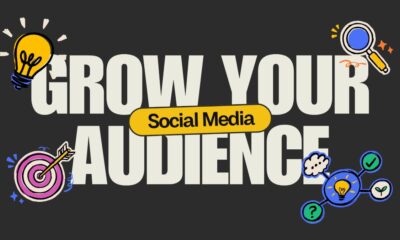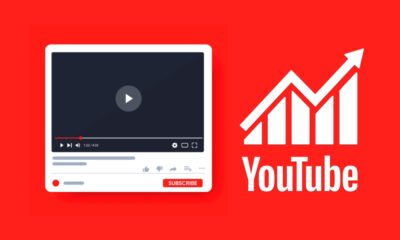Business
SEO for Musicians: How to Increase Your Music Career and Online Reach as a Musician

To make it easy for both new and existing fans to find you with only a few clicks, search engine optimization (SEO) involves determining your target demographic, building a landing page, and using keywords.
It’s one thing to have your music heard, but it takes work to convince people to take notice. Fortunately, there are lots of resources available to assist in connecting you with potential listeners. Search engine optimization, or SEO, is one of the most important elements of your online marketing plan.
SEO has a significant impact on both music promotion and online visibility. You may increase your visibility to both new and existing followers by giving SEO top priority on your website, social media accounts, and streaming services like YouTube and Spotify. In order to advance your musical career and reach the correct audience, SEO is crucial for musicians.
Why is SEO Important in the music industry, and what does it entail?
The process of making content online “searchable” by search engines, such as Google, is known as search engine optimization. It entails making use of pertinent metadata and keywords on your social media accounts, artist website, and other online music distribution channels.
Another crucial element to take into account when posting new releases to streaming services is the music metadata. If you provide this information correctly, it can help others find and promote your music more easily, which can help it appear on playlists and attract new listeners.
Consider the fact that we Google whatever notion or query we have. This also holds true for music. Indeed, even if there is an abundance of material available online, incorporating SEO into your digital marketing plan enables you to take control of the online area that appears when someone searches for you or your music.
By employing SEO, for instance, you can make sure that when someone types in your artist or project name in the search bar, it appears. Additionally, SEO helps you notify your followers about upcoming shows and tours and helps you promote them. In essence, SEO helps you stay in touch with your existing fan base, makes it easier for new fans to find you, and advances your musical career.
Musicians’ SEO Objectives
So, how do you leverage SEO to your advantage? First, identify your audience and your goals, or the people you want to reach and the reasons behind them.
Determine Who Your Intended Audience Is
A key component of having SEO work for you is knowing who you believe will be interested in your music. Examine who has previously listened to your song to start. What is the typical age and demographic range of them? What additional hobbies and genres of music do they enjoy? In order to show up in search results that attract the correct kind of traffic, your keyword research should take your audience’s behavior into consideration.
You may develop an SEO strategy that helps your music reach the right listeners by gaining a clear understanding of your target audience—your current and potential fans who are looking for new music.
Establish Attainable SEO Goals
Knowing who your audience is can help you define quantifiable, targeted goals that will help you engage with them. Typical SEO objectives for musicians could be:
- Boosting the amount of visitors to websites
- Enhancing the placement of particular terms in search results
- Increasing your fan base on social media
You may outline your goals and identify your audience more clearly, which will help you as a musician build a roadmap to even greater success in the digital realm. Let’s now examine how SEO can be used to achieve that.
Improve The SEO And Website For Your Music
Content and Keywords Are The Two Main Elements of Online Space Optimization
Optimizing keywords for musicians
Using the proper SEO keywords is always the first step in content optimization, and your artist or band name is the first term to focus on. Making your name searchable even if it doesn’t seem like a band name is known as optimizing your name in your content.
For instance, Quick Chills is the name of my band. Searching for “quick chills” on Google yields results that are more indicative of a medical condition than what we were hoping to find. But if you search for “quick chills band” or “quick chills music,” you’ll find us!
That’s because on our platforms, we’ve added the words “music” and “band” after our name. Quickchillsmusic.com is our domain (domain name counts for keywords, too!). Everywhere we look, our biographies claim that we are a band that plays music. However, “quick chills” is too general a term for Google to identify as simply a band, so if needed, make sure to back up your moniker with your identity.
After you’ve optimized your name, you should consider other SEO terms or phrases that best describe your band, such as: What kind of music do you perform? Which subgenres are represented in your sound? Who’s voice are you? This will assist you in adding more keywords to the text of your social media posts, bio, and website.
Generating And Overseeing Content
Your website is the first step in this. To interact directly with fans and establish your online music store at Number One, every musician needs a website. Your music marketing methods can be further guided by using SEO tools like as Google Analytics and Google Search Console, which can assist you in better understanding your fans’ interests. But you need to have content on your website if you want to start ranking highly in search results.
Let’s Examine Each Page Individually:
Home Page
The home page of your website acts as a snapshot of your musical universe. It should have a clear representation of your brand, your name, and a tagline that contains pertinent keywords. Furthermore, you should ensure that your page is easy for users to navigate. A well-designed and visually appealing website promotes user engagement, which boosts your site’s ranking in search engine results pages (SERPs) by encouraging users to scroll, click, and stay on a page.
About Page
This page gives your followers more insight into your persona, musical journey, and ways that they may connect with you outside of your music. This page provides extra chances for musicians to incorporate keywords that represent their brand in terms of SEO. Additionally, an interesting story keeps readers on the page longer, which improves search engine optimization of the content.
Music Library
You may sell your music straight online here and provide clear direction to users who land on your page by creating a page just for your albums and singles. Additionally, you’ll have more opportunity to produce and distribute more pertinent content if you optimize each release with thorough lyrics, descriptions, and any inspiration behind the music.
Events and Tours Page
Make sure that the dates and events of your trip contain keywords particular to the area. Give thorough explanations that include links to the venue, ticket information, and details. This promotes website engagement (clicks, scrolling) and keeps your fans informed.
News/blog Section
Use a blog or news page to inform your audience. You can write about subjects that are relevant to your own music or examine some topics that are current in your genre and offer your opinion in a post. One excellent way to naturally include keywords and improve your SEO is by blogging.
Videos
More than ever, search engines are searching videos for content. Generally, YouTube videos can be directly embedded on your website. Make sure to include pertinent keywords in the descriptions, tags, and titles. Transcripts are another option to think about if you want to increase accessibility and SEO.
Fan Endorsements and Reviews
While content is undoubtedly important for SEO, search engines are also using reviews to verify the legitimacy of websites as the Internet grows. Not only do user reviews and testimonials provide valuable material to your website, but they also signal to search engines that you are a legitimate business and not a fraudster.
Creating content for your artist or band website is really important, and as you go along, it becomes easier to use the keywords you have selected.
Sophisticated SEO Tactics For Musicians
Although content is crucial for SEO, after your material is optimized, you may employ more sophisticated strategies.
Technical SEO: Backlinks and Tags
Even though SEO is constantly changing and the Google algorithm is constantly determining what is and is not relevant in terms of optimization, improving your website’s tags is still a cutting-edge SEO strategy that is effective. In order to rank better in the search engine results page (SERP), tags are essential for conveying to search engines the purpose of your website.
By giving search engines additional information about your website through tag optimization, you make it easier for both present and potential listeners to find you. Tags include title tags, meta descriptions, and alt tags for images.
For technical SEO, developing a robust backlink profile is another tactic. Links pointing from one website to another are known as backlinks in the SEO community. Search engines look for backlinks as an additional source of authority and trust, thus the more high-quality backlinks you have, the better.
Here Are Several Ways To Get High-quality Backlinks:
- Guest posting on the webpage of another musician or music blogger
- collaborating and cross-promoting with other musicians
- crafting a fantastic blog content that is re-shared on other reputable websites
- Adding your work to music directories
- Distributing your material via social media
- Providing endorsements for products or services you truly use and find enjoyable
Social Media and SEO Integration
Social media is a marketing powerhouse for all organizations, and your band and music career are no exception. SEO incorporates it. If you haven’t been on social media before, start by figuring out which platform works best for you. Is Instagram the platform for sharing images, videos, and captions? For video material, TikTok or YouTube? Facebook for updates and event sharing?
The social media networks you use should be in line with the demographic you have designated as your target. What places do your listeners frequent? You can incorporate your keywords into your usernames, bio, profile, captions, title tags, and hashtags once you’ve decided where you want to be online.
You can also include backlinks to your music releases, event tickets, and website. For a more seamless integration, make sure your website has links to your social network accounts.
In summary, although it could initially appear like a difficult undertaking and an additional duty for your music career, SEO actually gets easier and more organic as you use it. Take things one step at a time and give yourself enough time to develop a plan that fits your objectives.
-

 Sports4 weeks ago
Sports4 weeks agoFIFA Club World Cup 2025: Complete List of Qualified Teams and Groups
-

 Sports2 weeks ago
Sports2 weeks agoAl Ahly vs Inter Miami, 2025 FIFA Club World Cup – Preview, Prediction, Predicted Lineups and How to Watch
-
Health1 week ago
Back to Roots: Ayurveda Offers Natural Cure for Common Hair Woes
-
World4 weeks ago
Omar Benjelloun: Strategic Architect Behind Major Financial Deals in the MENA Region
-

 Sports3 weeks ago
Sports3 weeks agoFIVB Men’s Volleyball Nations League 2025: Full Schedule, Fixtures, Format, Teams, Pools and How to Watch
-

 Tech1 week ago
Tech1 week agoFrom Soil to Silicon: The Rise of Agriculture AI and Drone Innovations in 2025
-

 Startup2 weeks ago
Startup2 weeks agoHow Instagram Is Driving Global Social Media Marketing Trends
-

 Science4 weeks ago
Science4 weeks agoEverything You Need to Know about Skywatching in June 2025: Full Moon, New Moon, Arietid Meteors, and Planetary Marvels

























